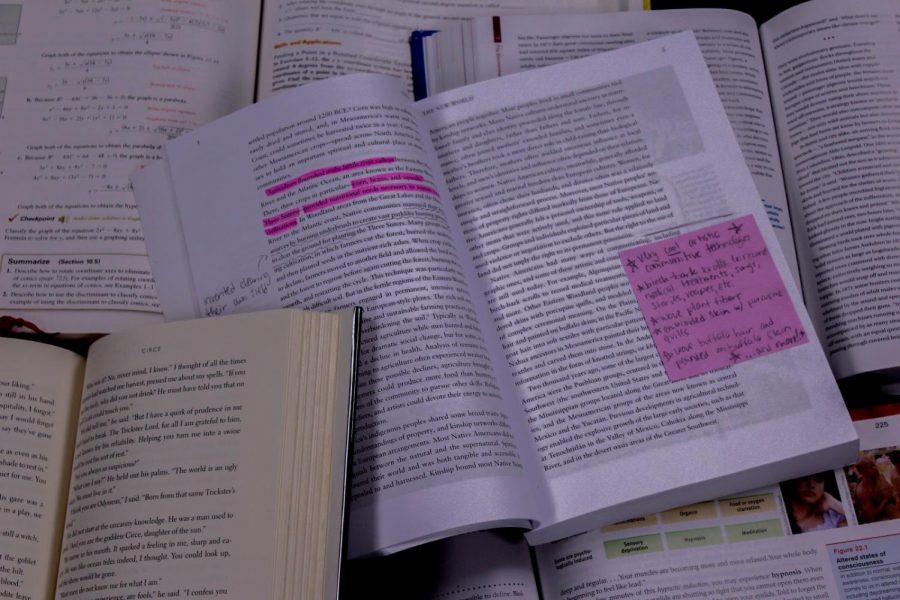Common Core is the antithesis of a good education
November 19, 2020
Albert Einstein, a household name and famous physicist, once said, “Any fool can know. The point is to understand.” Known for his brilliance, Einstein acknowledges that understanding is much more than just knowing information.
Schools across America need to hear this statement. While certain teachers recognize this and try to do better, most are stuck with Common Core State Standards (CCSS). With no time to expand on their subjects, teachers are being encouraged to teach to the test so students can– keyword here– know the answers to their tests rather than useful knowledge.
In case you aren’t from the U.S. or have been living under a rock the past decade, the Common Core State Standards were implemented in 2010 to give schools educational standards for core subjects to meet. They are made for students from kindergarten to senior year.
CCSS emerged from the wreckage of No Child Left Behind (NCLB) from years prior. Failing spectacularly, NCLB saw millions of children fail according to their standards.
It was finally replaced with the Every Student Succeeds Act (ESSA) which required parent input and left it up to the state what their standards were. Others may argue that states are not required to follow Common Core, and technically that’s true. However, to receive funding standards set must be extremely close to CCSS with few changes.
Common Core has many problems, predominantly how it was developed. Being a secretive process, many educators became determined to solve the mystery of where these standards came from.
Out of fifteen writers for the math standards, Mercedes Schneider identified only four as former classroom teachers, ranging anywhere from the most recent to left the school system five years ago to current college professors. None of these educators have had any experience with special needs or ESL kids. None of these have taught in a primary school setting. None of these were teaching in 2009 when they were written. Only three of these had experience teaching math in any setting. The majority of these writers for the mathematic standards (once again, let me emphasize) never had any sort of teaching experience, much less when they were being written.
Anthony Cody, a former teacher and now co-founder of the Network for Public Education writes, “Had the Common Core been the result of the public process and debate, including educators and education experts, serious problems might have been identified and avoided. We should have learned one big thing from No Child Left Behind: when high stakes are attached to tests it will result in teaching to the test. Common Core standards are tightly linked to a system of high stakes tests that are undermining good teaching.”
In his blog post, The Common Core is a Remedy Worse than the Disease, he expands on this idea by giving the statistics of tests scores dropping, “In fact, new tests aligned with Common Core are yielding scores that are significantly lower than previous tests. In New York, the number of students termed “proficient” dropped to around 31%. English learners did even worse – only 7% were deemed proficient..”
To me, a student in this system, something scarier than these test scores dropping is that people believe this will prepare me for college in just two years. A main point of CCSS is College and Career Readiness. Many workplace supervisors suggest that skills students need in the workplace are not covered by CCSS.
One contradiction between the CCSS website and Jason Zimba, the lead writer of the CCSS, is this: Zimba said, “If you want to take calculus your freshman year in college, you will need to take more mathematics than is in the Common Core.”
Meanwhile, the website states, “The standards were drafted by experts and teachers from across the country and are designed to ensure students are prepared for today’s entry-level careers, freshman-level college courses, and workforce training programs.” Zimba basically says the truth, you need to take more math than what is in the CCSS list while the website says that is not true, although it is.
“We should be able to look every second grader in the eye and say, ‘You’re on track, you’re going to be able to go to a good college, or you’re not. Right now, in too many states, quite frankly, we lie to children. We lie to them and we lie to their families.” said Education Secretary, Arne Duncan during a visit to a Brooklyn charter school.
Bloomberg accompanied him and offered his counter that it is one of the most offensive things you could say, and I agree. Not only offensive but completely discouraging to these young kids.
Minds change from elementary school to high school, sometimes learning disabilities are recognized a little later. Kids can move from other countries and are experiencing the language to eventually become top of their class. Even homelife struggles can affect growth for a while.
This leads to our next problem in Common Core: every child needs an identical experience. The truth is, and everyone knows, there are different types of education and learning disabilities.
The obvious accommodations, like deaf and blindness, are met. It’s the more mental disabilities that are not met where they are. For students behind, they do not receive another option. Kids on the autism spectrum, developmental language disorders, and other cognitive disorders struggle to meet the standards.
Not to even mention other factors in kids like being new to a language, ADHD, dyslexia, their homelife, mental illnesses, like depression, anxiety, OCD, and parent’s education are all outside forces that affect school life. While those may not necessarily be directed at the Common Core State Standards, they need to be addressed in school and assisted, but that’s not what this is about. Either way, no accommodations are made in the standards. Teachers are just told to deal with it.
Furthermore, CCSS encourages teachers to stick to tests rather than expanding on the subject. An after-effect of NCLB is the stress it puts on teachers for those high scores because performance is linked to salary.
Many of my classmates could care less when it comes to these tests, and just a couple years ago I can remember them purposefully failing in hopes to get the teacher fired.
Why does the US put the livelihood of a living, breathing person into the hands of children? Any other career’s stability is not based on a child’s behavior, so why is a teacher’s?
Either way, the closer the end of the year becomes, the more stress is put on a teacher being torn between what’s more important to learn and what will be on the test. In ninth grade, my English teacher became a prime example of this.
Although in my district many of us become exempt from our exam anyway. I remember more and more kids disliking her as the exam inched closer. She was unhinged in stress and guilt.
For a bizarre reason, they saw a failing country and decided to fix it with harder standards to accomplish.
All the reasons just listed are how we got here, non-educators developing a program that has too much with too little time ending in stress for teachers, students struggling to understand, and somehow also too little work.
The system needs to be fixed. It could be done by teacher and parent input expanded on and using the different types of learning.
There are four types including visual, auditory, kinesthetic, and reading/ writing.
Visual learners do better when they can see things while auditory like to listen and speak their thoughts. Kinesthetic students learn through experience, like a lab, or acting out a scene.
Reading and writing kids are the only ones even close to a traditional school environment.
If CCSS could recognize this and implement it in their standards, more teachers would be required to compensate for all students.
Some teachers take the opportunity to do these types of things, but other teachers may do the same thing every day, never giving a variety of learning styles.
But even more than that, we need legislation that’s not afraid to reform our school standards.
As well, we need to encourage our students and teacher’s strengths instead of punishing them. A teacher’s weight should not be put on their students.
The standards could be improved on and pressure would be lifted off so many if we could live up to these ideas.
This legislation is much more than a president; but a senator, a school board, an administrator. Someone who is willing to take a risk for the greater good.
Our parents need to stop berating the teacher over a bad grade, but the student. Our parents need to realize if their kid accomplished substandard expectations, it only makes sense to grade their work reflecting on the choice.
As a country, we need to do more for our students, because just knowing the answers for a test they will fail isn’t working. Instead, we should learn to understand why something is the way it is.




